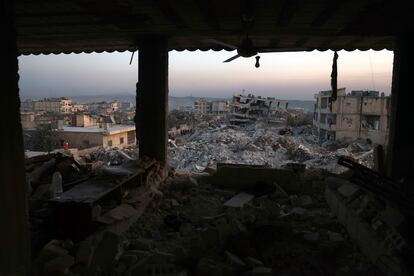UN commission: Earthquake aid was slow to reach Syria
An investigation should be opened into why it took a week to open border crossings for aid to flow, the commission said

The international community and the Syrian government did not act quickly enough last month to help people in need in the rebel-held northwest after a deadly earthquake hit Turkey and conflict-ravaged Syria, a UN-backed commission said Monday.
The February 6 magnitude 7.8 earthquake and strong aftershocks that ravaged southern Turkey and northwestern Syria killed more than 50,000 people, including over 6,000 in Syria.
The Independent International Commission of Inquiry on Syria said there should be an investigation into why it took a week to open border crossings for aid to flow. It added that war-torn Syria “now needs a comprehensive cease-fire that is fully respected” for civilians, including aid workers, to be safe.
The commission also said there have been new attacks in Syria, including a reported Israeli airstrike last week on the international airport of the northern city of Aleppo putting it out of service for three days. The airport has been a main point for aid flowing into Syria and flights were diverted to two other airports when it was closed.
The commission is made up of outside, independent experts who have been working under a mandate from the UN-backed Human Rights Council since nearly the start of the Syrian conflict in 2011.
It took a week for the UN and the government of Syria’s President Bashar Assad to agree on opening two more border crossings into the rebel-held region bordering Turkey as many people were still under the rubble.
“Since the earthquake, we have seen many acts to help victims by the Syrians themselves,” commission member Paulo Pinheiro said during a news conference in Geneva. He added that “we also witnessed a complete failure by the government and the international community including United Nations to rapidly direct urgent lifesaving aid for northwest Syria.”
“Many days were lost without any aid to survivors of the earthquake,” Pinheiro said. “Actors didn’t rapidly direct urgent lifesaving aid to northwest Syria which became the epicenter of neglect.”
A week after the earthquake, the UN announced that Syrian President Bashir Assad agreed to open for three months two new crossing points from Turkey to the country’s rebel-held northwest to deliver desperately needed aid and equipment to help earthquake victims. Before that, the UN had only been allowed to deliver aid to the northwest Idlib area through a single crossing at Bab Al-Hawa, at Syrian ally Russia’s insistence.
“They failed to deliver international emergency support including rescue teams and equipment in the vital first week after the earthquake,” Pinheiro said, adding that “Syrians, for good reasons, felt abandoned and neglected by those who (are) supposed to protect them in their most desperate time.”
“Many voices are rightly calling ... for an investigation and accountability to understand how this failure, this disaster happened beyond the earthquake,” Pinheiro said.
Commissioner Hanny Megally said “it’s a shame that all the actors really involved have not been helping in this area and it is difficult of course without proper investigation to say who’s most responsible.”
The commission called on nations who have nationals held in the camps of al-Hol and Roj in northeast Syria to speed up the repatriation process. It said conditions are deteriorating at the camps that are housing some 56,000 mostly women and children linked to the Islamic State group.
“The suffering inflicted on them may amount to the war crime of committing outrages on personal dignity. We call again for repatriations to speed up,” the commission’s report said.
At the fenced camp of al-Hol, there are some 50,000 Syrians and Iraqis crowded into tents. Nearly 20,000 of them are children; most of the rest are the wives and widows of IS fighters. In a separate, heavily guarded section of al-Hol known as the annex are an additional 2,000 women from 57 other countries – they are considered the most die-hard IS supporters – along with their children, numbering about 8,000.
Some countries, including France, Spain, Russia and Iraq repatriated some of their citizens in recent months but many other countries still refuse.
“Health care is very limited, education is very limited and some of those children have no life apart from these awful conditions,” said commissioner Lynn Welchman. “These camps are horrendous places.”
Sign up for our weekly newsletter to get more English-language news coverage from EL PAÍS USA Edition
Tu suscripción se está usando en otro dispositivo
¿Quieres añadir otro usuario a tu suscripción?
Si continúas leyendo en este dispositivo, no se podrá leer en el otro.
FlechaTu suscripción se está usando en otro dispositivo y solo puedes acceder a EL PAÍS desde un dispositivo a la vez.
Si quieres compartir tu cuenta, cambia tu suscripción a la modalidad Premium, así podrás añadir otro usuario. Cada uno accederá con su propia cuenta de email, lo que os permitirá personalizar vuestra experiencia en EL PAÍS.
¿Tienes una suscripción de empresa? Accede aquí para contratar más cuentas.
En el caso de no saber quién está usando tu cuenta, te recomendamos cambiar tu contraseña aquí.
Si decides continuar compartiendo tu cuenta, este mensaje se mostrará en tu dispositivo y en el de la otra persona que está usando tu cuenta de forma indefinida, afectando a tu experiencia de lectura. Puedes consultar aquí los términos y condiciones de la suscripción digital.








































